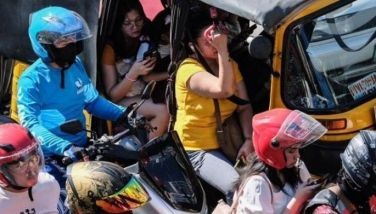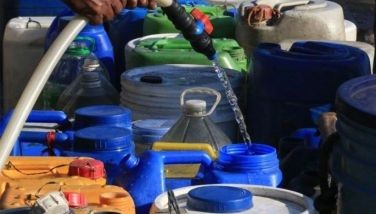Unicef worried polio might re-emerge in RP
July 14, 2005 | 12:00am
The United Nations Children’s Fund (Unicef) has expressed concern over the possible entry of poliovirus to the Philippines because of the country’s proximity to Indonesia where the disease has resurged.
Dr. Steve Atwood, regional advisor of Unicef for Health and Nutrition in East Asia and Pacific, said the Philippines is "at risk" in dealing with the illness because it is "very close to Indonesia and there is a lot of trade that goes on between the two countries."
The Philippines has been polio-free since 1993, but so was Indonesia two years after, Atwood said.
"The reason why we are worried about the region is because Indonesia was polio-free since 1995, and now 120 kids are paralyzed with polio," Atwood told a press conference at a health center in Marulas, Valenzuela City where Health Secretary Francisco Duque III led a polio immunization campaign.
Poliovirus is a highly infectious disease that invades the nervous system. It could cause crippling paralysis in a matter of hours in some cases.
The disease usually affects children below three years old but adults are not totally spared. It is incurable but can easily be prevented through vaccination.
"We know that no child is safe in the world until every child is free of polio and we haven’t reached that yet. Our goal is to interrupt transmission regionally by the end of 2005," Atwood noted.
To keep polio out of the Philippines, the Department of Health (DOH) is beefing up its routine vaccinations especially in the Autonomous Region in Muslim Mindanao and the regions of Bicol, Southern Luzon, Western Mindanao and Central Mindanao.
"Our coverage for oral polio vaccine for the whole country is 73 percent. We need to bring that up for 85 to 90 percent as soon as possible," Duque said.
It is recommended that children be vaccinated as early as six weeks of age, followed by second and third doses at one-month intervals.
Dr. Romanus Mkerenga, chief of Unicef-Philippines for Health and Nutrition, said that it is very important for the local government units in Mindanao, called the Philippine southern backdoor, to be vigilant against polio because the region is nearest Indonesia.
"It is important to communicate information to the public especially those in areas that are bordering Indonesia. We have to advocate to the local officials in Mindanao so that they can be very vigilant," Mkerenga said.
Mkerenga added that health officials in Mindanao should ensure that all children are vaccinated.
Dr. Steve Atwood, regional advisor of Unicef for Health and Nutrition in East Asia and Pacific, said the Philippines is "at risk" in dealing with the illness because it is "very close to Indonesia and there is a lot of trade that goes on between the two countries."
The Philippines has been polio-free since 1993, but so was Indonesia two years after, Atwood said.
"The reason why we are worried about the region is because Indonesia was polio-free since 1995, and now 120 kids are paralyzed with polio," Atwood told a press conference at a health center in Marulas, Valenzuela City where Health Secretary Francisco Duque III led a polio immunization campaign.
Poliovirus is a highly infectious disease that invades the nervous system. It could cause crippling paralysis in a matter of hours in some cases.
The disease usually affects children below three years old but adults are not totally spared. It is incurable but can easily be prevented through vaccination.
"We know that no child is safe in the world until every child is free of polio and we haven’t reached that yet. Our goal is to interrupt transmission regionally by the end of 2005," Atwood noted.
To keep polio out of the Philippines, the Department of Health (DOH) is beefing up its routine vaccinations especially in the Autonomous Region in Muslim Mindanao and the regions of Bicol, Southern Luzon, Western Mindanao and Central Mindanao.
"Our coverage for oral polio vaccine for the whole country is 73 percent. We need to bring that up for 85 to 90 percent as soon as possible," Duque said.
It is recommended that children be vaccinated as early as six weeks of age, followed by second and third doses at one-month intervals.
Dr. Romanus Mkerenga, chief of Unicef-Philippines for Health and Nutrition, said that it is very important for the local government units in Mindanao, called the Philippine southern backdoor, to be vigilant against polio because the region is nearest Indonesia.
"It is important to communicate information to the public especially those in areas that are bordering Indonesia. We have to advocate to the local officials in Mindanao so that they can be very vigilant," Mkerenga said.
Mkerenga added that health officials in Mindanao should ensure that all children are vaccinated.
BrandSpace Articles
<
>
- Latest
- Trending
Trending
Latest
Trending
Latest
Recommended






























